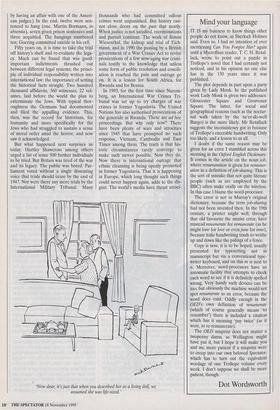Mind your language
IT IS my business to know things other people do not know, as Sherlock Holmes said. Even so, I had no intention of ever mentioning Can You Forgive Her? again until a Mycroftian reader, T. C. H. Retal- lack, wrote to point out a puzzle in Trollope's novel that I had certainly not noticed, and in his opinion no one else has in the 130 years since it was published.
The plot depends in part upon a party given by Lady Monk. In the published work Lady Monk is given two addresses: Gloucester Square and Grosvenor Square. The latter, for social and geographical reasons (such as the noctur- nal walk taken by the ne'er-do-well Burgo) is the more likely. Mr Retallack suggests the inconsistency got in because of Trollope's execrable handwriting. Only too likely, and a lesson to us all.
I doubt if the same reason may be given for an error I stumbled across this morning in the Oxford English Dictionary. It comes in the article on the noun job, where renumeration is given for remuner- ation in a definition of job-sharing. This is the sort of mistake that not quite literate people (such as are employed by the BBC) often make orally on the wireless. In this case I blame the word-processor.
The error is not in Murray's original dictionary, because the term job-sharing had not been invented then. In the 19th century, a printer might well, through that old favourite the minim error, have misread renumerate for remunerate (as he might lone for love or even June for inne), because italic handwriting tends to writhe up and down like the palings of a fence.
Copy is now, it is to be hoped, usually presented for typesetting not in manuscript but via a conventional type- writer keyboard, and on this m is next to n. Moreover, word-processors have an automatic facility that attempts to check each word to see if it is definitely spelled wrong. Very handy such devices can be too, but obviously the machine would not spot renumerate as an error, because the word does exist. Oddly enough in the OED's own definition of renumerate (which of course generally means 'to renumber') there is included a citation which has it meaning 'pay twice' (as it were, to re-remunerate).
The OED misprint does not matter a twopenny damn, as Wellington might have put it, but I hope it will make you and me more patient if a misprint were to creep into our own beloved Spectator, which has to turn out the equivalent wordage of one Trollope volume every week. I don't suppose we shall be more patient, though.
Dot Wordsworth


















































































 Previous page
Previous page